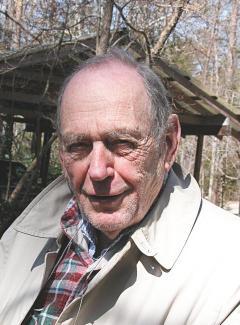Eugene A Stead. Jr. October 6, 1908 - June 12, 2005
June 12, 2005:
Just say for me ...
E. A. Stead, Jr.
 Each day, I get up and smile, because today will bring a
surprise and over my career and life, most surprises have been
pleasant. My story reflects a life long passion for enjoying what I
do. My main joy comes from building manpower that is excited by and can
interact with opportunities in a positive manner and
can make the world a better and more interesting place.
Each day, I get up and smile, because today will bring a
surprise and over my career and life, most surprises have been
pleasant. My story reflects a life long passion for enjoying what I
do. My main joy comes from building manpower that is excited by and can
interact with opportunities in a positive manner and
can make the world a better and more interesting place.
I built this web site as an experiment. I want to see if I can continue to both energize young people and, at the same time, bring some new life to older folks. (To facilitate finding my page, I have acquired the domains: http://easteadjr.org and http://www.easteadjr.org. My old head simply can't remember the address that Frank initially provided. This seems like a more sensible solution because few will forget my name.) As you can clearly see, my personal challenge is that my short term memory is increasingly unreliable. This feature of my head has the potential of limiting what I can do. Those of you that know me well, fully realize that I have never been a respector of limits. Since I have made a life of converting liabilities into assets, I believe that my unreliable short term memory creates new opportunities for remembering. I believe that the Internet, with Google as my navigational tool, will be a very efficient substitute for my short term memory. Moreover, Google and Internet resources bring to my desk the opportunity for just-in-time learning. If I'm correct, then in time, others will come to appreciate the utility of Internet memory and learning when we need or want to learn. Together we'll build a new educational paradigm that reflects the opportunities of living within a mostly boundaryless world, free of the constraints of a biological memory. I've written a number of essays over my career, many that never passed editorial review. Finally I have a way to share my thoughts without editors distorting the image I wish to create. Visit my thoughts Past members of the faculty and housestaff have also learned how to escape editorial revision with their thoughts. Visit the Stead Stories from the housestaff. Finally, I believe that typing and Internet searching, in time, will become standard skills that every school child will be taught. They will stand beside reading, writing and arithmetic as essential survival skills. Why am I so certain? It is because these new tools provide, for the first time, a mechanism for informal, self-directed just-in-time learning. By invoking learning only when we need new tools for solving a problem, we can avoid the forgetting curve associated with learning rarely used facts and concepts. For me, I am exploring these ideas by supplementing my faulty short term biological memory with Google and the Internet. If you find this idea compelling, then test it with yourself. In time and with practice you will come to accept the marriage of biological and Internet memories and will become a believer in just-in-time learning. The only obstacle is the medical school monopoly. Realizing that skill comes only with practice, I place below, Google, so that you can practice your skill from my web page. Enjoy learning this new skill. As a test - search for: medical school monopoly - and see what is at the top of the list. Or explore searching "just in time learning" or "just in case learning". Because many of you may have overlooked the forgetting curve, you might also profit from searching for the "forgetting curve".
|